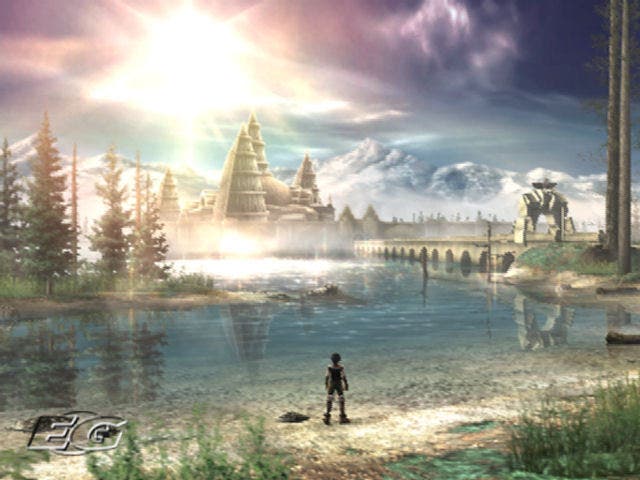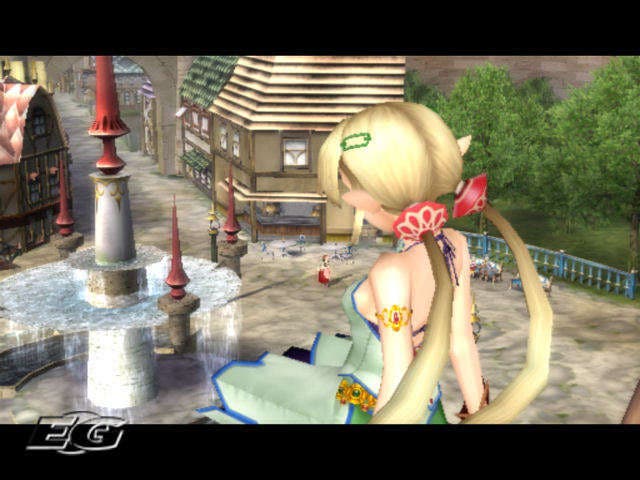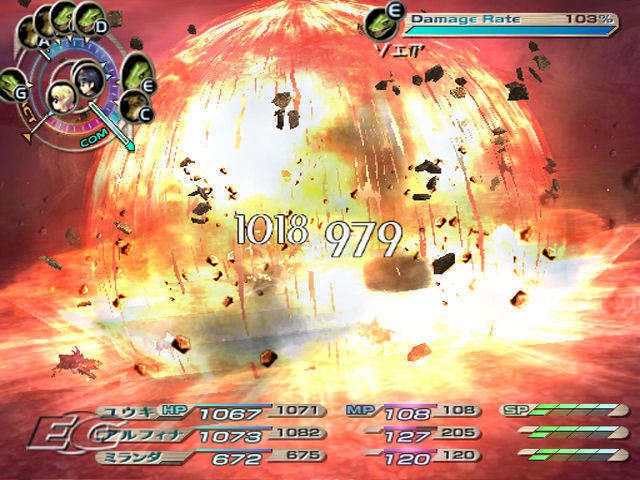Grandia III
Grand, but bland.
Back in the distant heyday of the Dreamcast, we should probably have seen the trouble on the horizon. Despite featuring a great selection of titles in general, Sega’s underappreciated box of wonders featured a mere two RPGs that anyone deemed worth talking about; Sega Overworks’ Skies of Arcadia, and Game Arts’ Grandia II.
Skies of Arcadia was the only one it was really acceptable to genuinely like. However, I’m going to have to now stand up and admit it.
I preferred Grandia II.
There. I said it. Skies of Arcadia’s world was richer, its story more joyful, but its encounter rate was ridiculous, and its battle system was beyond tedious when compared to Grandia II, even if the latter title did star a (by then) traditionally jerkfaced protagonist and a plot in which you ended up having to kill God (as you do).
It’s entirely possible that I’ve lost the respect of everyone reading this by slightly disliking Skies of Arcadia, but I tend to base my preferences on the bits of a game I actually play. So its good news for me that the evolution of the battle system in Grandia III has resulted in the most viscerally exciting turn-based battles available in any RPG.

Rather than a traditional turn-based battle system, in which each character attacks strictly in turn, here the game system uses a turn dial, where you can see all player character and enemies progress towards their turn at their own speed. At one point of the dial, the decision point lies, where you or the enemy choose the next move (combo attack, critical attack, magic, special move, and so on), from which point the character is charging the attack. So, for a normal attack, the charge is near instantaneous, while for a special move or magic spell, the charge can be distressingly slow.
Herein lays the beauty of the system. With up to four characters under your control and any number of enemies progressing around the turn dial, you can time your attacks of your party, allowing you to not only cancel enemy attacks as they charge, but also perform devastating attack combination such as aerial juggles, trusting that your timing and strategy are true. Unlike many RPGs in which turn-based battles become either a chore or something you barely need to pay attention to, here even the simplest battle can require concentration. Even if you do become tired of the system, it’s possible to either set the player characters as computer-controlled, or avoid the majority of them by simply dodging the enemies within the game world.
Developer Game Arts has also chosen to jettison the staid plot styling of it’s prequel with a return to the almost relentlessly upbeat adventuring featured in the original Grandia. As good as that sounds, the extremes to which they’ve taken this is blatant from the moment the disc spins up. The de rigueur introductory montage of scenes from the game (displayed in a more or less random order) features such a sickeningly saccharine brand of pop rock that you could expect it was soullessly recorded by the least interesting contestant from a reality TV show. An actual single from Japanese artist Miz, it’s a disgustingly poor piece of aural pap meaninglessly shoehorned in, but we can’t judge a game by its intro soundtrack. Thankfully the song makes a mercifully short number of appearances, with the rest of the score pleasant, though forgettable, is provided by Noriyuki Iwadare.

Mashing start to get past the ungodly musical number will take you to a fairly unique and interesting beginning to a Japanese RPG, as teenaged protagonist Yuki tries to follow in the footsteps of his hero, the legendary pilot Schmidt, in flying across the sea. After 18 failures, he finally thinks he’s cracked it with his 19th plane design, only to crash miserably due to the fact his mum decided to stowaway.
Yes. This might be the first RPG in which you spend a fair portion of it on an adventure with your mum. Imagine what that would be like in reality. Being revived after a battle by your mum spitting on a hanky and wiping your face with it, or being told you’re not allowed to adventure any further until you drink all of your green potion.
Now, strange as it may sound, there’s actually a fairly long lineage of people going on adventures with their mum in Asian literature - Jet Li fans might recognise the precedent from the Fong Sai-Yuk series of films, and here, too, it’s actually quite a pleasing, if underused, plot device, though it unfortunately disappears far too early in the game. The rest of the plot is the usual nonsensical fluff featuring alternate dimensions and star crossed love, told in a completely overwrought fashion, ending with all long cinematics classed as tea breaks by this reviewer.

The game is saved from total mediocrity by its superb battle system, but a fantastic battle system does not a brilliant game make. With such a dire main plot, you could hope that an expansive world and side quests could maintain interest, but each of the world’s location are tiny and forced, and the game offers almost nothing in the way of extra challenge other than a very small series of quests featuring ‘Otto the Boy Detective’, a thinly veiled play on the long running manga/anime Detective Conan. Even the dungeons are completely linear paths from A to B.
Grandia III can be an enjoyable trip for the 30 to 40 hours it takes to complete, as each battle is a joy even in the most boring of dungeons, but while the original Grandia II battled against roughly one other title on the Dreamcast and still came out second in most eyes, Grandia III has to compete on a system with dozens of other RPGs all vying for your money. Sadly, it doesn’t even come close to second best.

